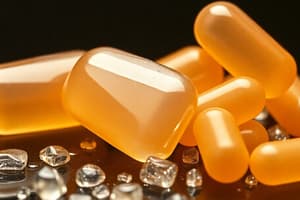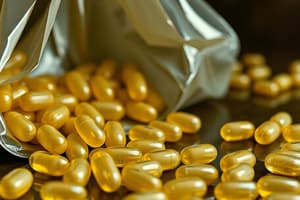Podcast
Questions and Answers
What occurs in a hydrolytic reaction?
What occurs in a hydrolytic reaction?
A chemical compound is decomposed by reacting with water, resulting in the formation of one or more new compounds.
What is the general equation for a hydrolytic reaction?
What is the general equation for a hydrolytic reaction?
A–B + H2O → A–OH + B–H
What are some examples of hydrolases?
What are some examples of hydrolases?
Esterases, proteases, glycosidases, nucleosidases, and lipases
What is gelatin, and how is it produced?
What is gelatin, and how is it produced?
What percentage of the total body protein content does collagen make up in mammals?
What percentage of the total body protein content does collagen make up in mammals?
What are the common uses of gelatin in foods and pharmaceuticals?
What are the common uses of gelatin in foods and pharmaceuticals?
What is the role of gelatinase in the breakdown of gelatin?
What is the role of gelatinase in the breakdown of gelatin?
How can gelatin hydrolysis be demonstrated in the laboratory?
How can gelatin hydrolysis be demonstrated in the laboratory?
What is the purpose of inoculating the nutrient gelatin deep tube and gelatin-agar medium plate?
What is the purpose of inoculating the nutrient gelatin deep tube and gelatin-agar medium plate?
What is the result of gelatin hydrolysis by microorganisms?
What is the result of gelatin hydrolysis by microorganisms?
Flashcards are hidden until you start studying
Study Notes
Lab 8: Gelatin Hydrolysis
- A hydrolytic reaction is a reaction that involves the decomposition of a chemical compound by reacting with water, resulting in the formation of one or more new compounds.
Hydrolases
- Hydrolases are biochemical catalysts that catalyze the hydrolysis of chemical bonds, yielding simpler products.
- Examples of hydrolases include esterases, proteases, glycosidases, nucleosidases, and lipases.
Gelatin
- Gelatin is a protein produced from the hydrolysis of collagen.
- Gelatin dissolves as a liquid above 25°C and solidifies when cooled below 25°C.
- Collagen is a major component of connective tissue in mammals, making up about 30% of the total body protein content.
Applications of Gelatin
- Gelatin is used as a solidifying agent in foods and sweets.
- Gelatin is used in the preservation of fruit and meat.
- Gelatin is used in the clarification of beer and wine.
- Gelatin is used in medicine capsules.
- Gelatin is used in the clarification of juices and vinegar.
- Gelatin is used in cosmetics.
- Gelatin is used in paper production.
- Gelatin is used as a coloring agent.
Gelatinase
- Gelatin provides a rich source of amino acids and peptides for bacteria.
- Gelatinase is a proteolytic enzyme that hydrolyzes gelatin into simpler compounds such as peptides and amino acids.
Gelatin Hydrolysis
- Hydrolysis of gelatin can be demonstrated by growing microorganisms in nutrient gelatin.
- In a liquid medium, the degradation of gelatin by gelatinase can be detected by observing liquification even below 25°C.
Practical Procedure
- Melt the gelatin-agar medium, cool to 45-50°C, and pour it into sterile Petri dishes.
- Label the nutrient-gelatin deep tubes and gelatin-agar medium plates with the name of the microorganism to be isolated.
- Use an inoculating loop to make a stab inoculation from the culture into a labelled deep tube of nutrient gelatin and to a Petri dish.
Studying That Suits You
Use AI to generate personalized quizzes and flashcards to suit your learning preferences.




